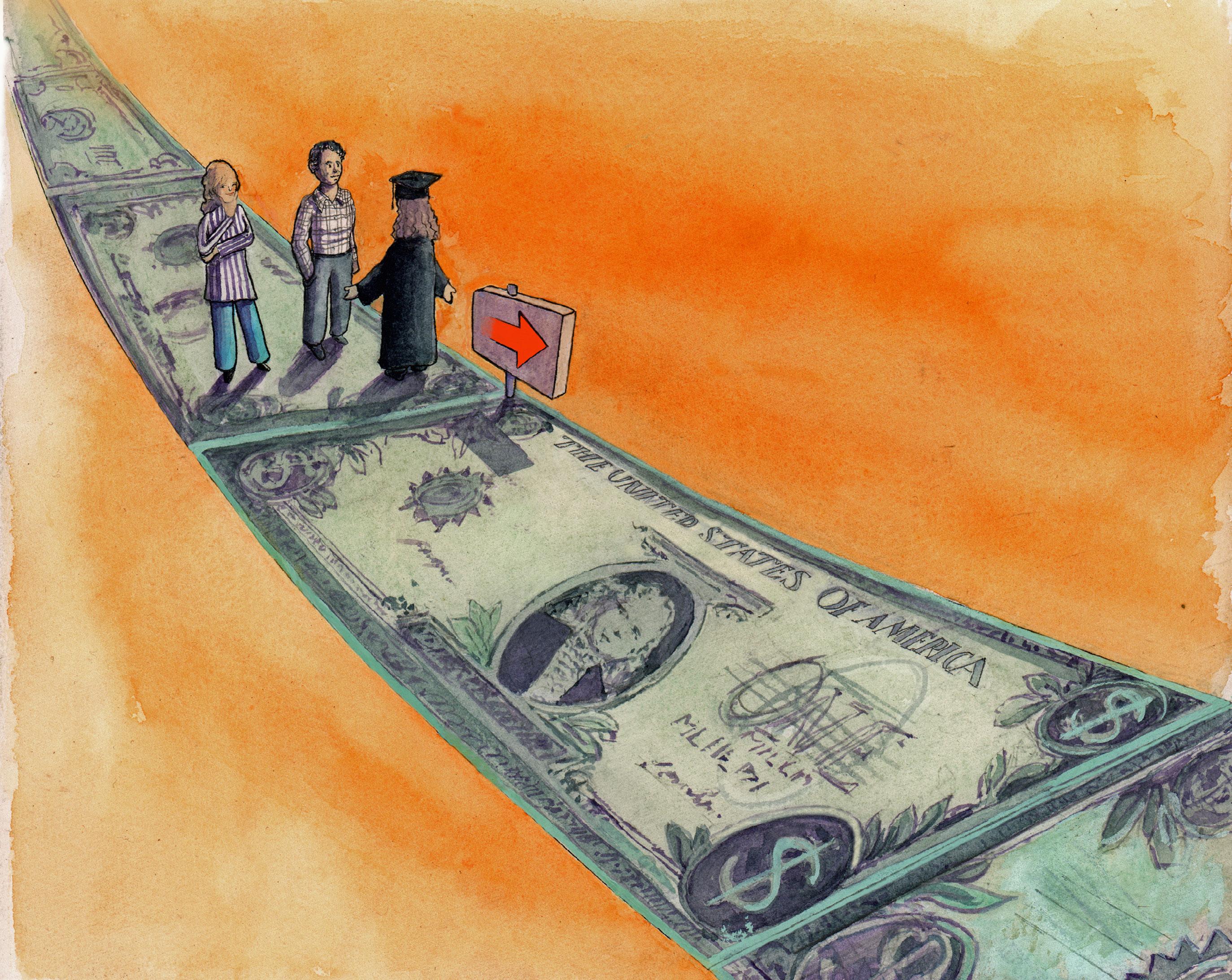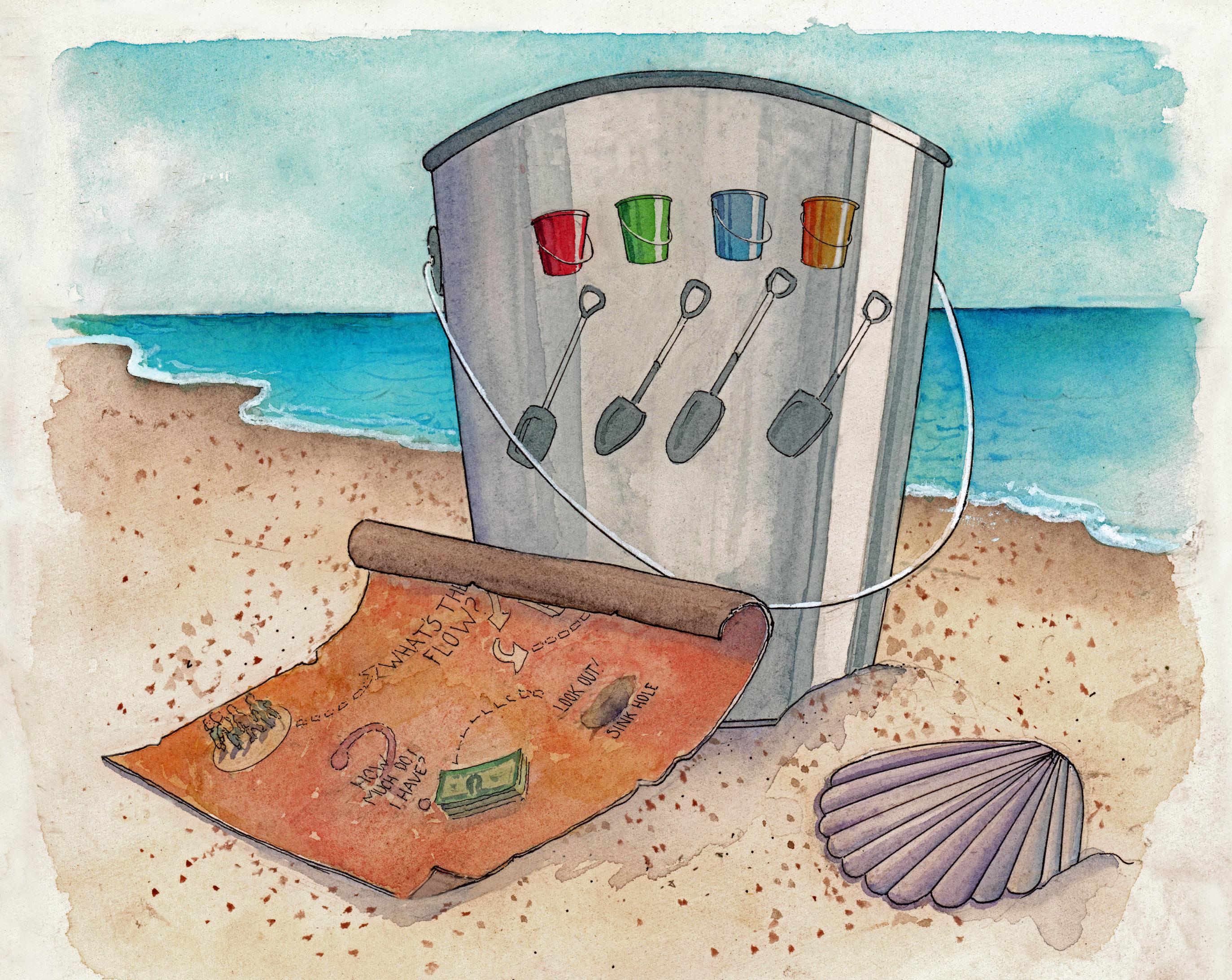
8 minute read
Introducing the Buckets, Shovels, Beach and Map
The Buckets
As you can see, each of the buckets is of a diff erent shape and size. This makes sense because the asset groups that each bucket represents are all very diff erent. Assets groups are the way we categorize our fi nancial products, which you will acquire during your life . With a little imagination and some organization, you will see that every asset can be placed into one of the fi ve buckets. Think about all the ideas we’ve already talked about and how they might fi t into each of these buckets.
Liquid Assets Bucket These are the assets that you can save and spend frequently with little or no tax eff ect. This is also where you would deposit your paycheck and pay your living expenses . Basically, this bucket contains your checking, savings account and liquid investments that are not tax deferred (retirement accounts are tax deferred) . These are the assets that you can save and spend frequently with little or no tax eff ect. This is also where you would deposit your paycheck and pay your living expenses . Basically, this bucket contains your checking, savings account and liquid investments that are not tax deferred (retirement accounts are tax deferred) . These are the assets that you can save and spend frequently with little or no tax eff ect. This is also where you would deposit your paycheck and pay your living expenses . Basically, this bucket contains your checking, savings account and liquid investments that are not tax deferred (retirement accounts are tax deferred) .
Insurance Assets Bucket These are the insurance assets and products that you will need throughout your lifetime . These include term life insurance, whole life insurance, and disability insurance, as well as property, casualty, and general liability insurance . Insurance Assets Bucket These are the insurance assets and products that you will need throughout your lifetime . property, casualty, and general liability insurance . Insurance Assets Bucket These are the insurance assets and products that you will need throughout your lifetime . property, casualty, and general liability insurance . Insurance Assets Bucket These are the insurance assets and products that you will need throughout your lifetime . property, casualty, and general liability insurance .
Personal Assets Bucket These are the physical assets that you own, such as your house, a second home, your car, your jewelry, and other valuable items . Often these assets include a loan or mortgage (for instance, for a car or a house) . Personal Assets Bucket These are the physical assets that you own, such as your house, a second home, your car, your jewelry, and other valuable items . Often these assets include a loan or mortgage (for instance, for a car or a house) . Personal Assets Bucket These are the physical assets that you own, such as your house, a second home, your car, your jewelry, and other valuable items . Often these assets include a loan or mortgage (for instance, for a car or a house) . Personal Assets Bucket These are the physical assets that you own, such as your house, a second home, your car, your jewelry, and other valuable items . Often these assets include a loan or mortgage (for instance, for a car or a house) .
Retirement Assets Bucket These are the assets that are accumulating on a tax deferred basis, and they are specifi cally for your retirement. These include IRAs, pension plans, 401(k) accounts, and social security . Retirement Assets Bucket These are the assets that are accumulating on a tax deferred basis, and they are specifi cally for your retirement. These include IRAs, pension plans, 401(k) accounts, and social security . Retirement Assets Bucket These are the assets that are accumulating on a tax deferred basis, and they are specifi cally for your retirement. These include IRAs, pension plans, 401(k) accounts, and social security .
Investment Assets Bucket These are long-term assets such as rental real estate, your company, or possibly an inheritance that you expect to receive . The hope is that these assets will appreciate over time and will generate a large amount of cash when it comes time to liquidate them—to sell them . Investment Assets Bucket These are long-term assets such as rental real estate, your company, or possibly an inheritance that you expect to receive . The hope is that these assets will appreciate over time and will generate a large amount of cash when it comes time to liquidate them—to sell them . Investment Assets Bucket These are long-term assets such as rental real estate, your company, or possibly an inheritance that you expect to receive . The hope is that these assets will appreciate over time and will generate a large amount of cash when it comes time to liquidate them—to sell them .
The Shovels






The shovels represent the experts who have the training and experience to guide you through the ongoing process of most effi ciently fi lling and emptying the buckets at the right time. Right now, you probably don’t need to worry much about having advisors, but as you get older, and start to accumulate more “stuff ”, you’ll need knowledgable people who can help you manage it all so you don’t make costly mistakes . The shovels are:


Your CPA Shovel This expert is usually an accountant, and handles your taxes and helps you manage your money . People who have a lot of money usually need help managing it all so that they don’t spend too much, can aff ord all of the things they want to buy and still have funds for an emergency and retirement . The CPA is also the person who helps manage all of the other experts .
Your Attorney Shovel This expert handles all of the legal paperwork related to your fi nances. Ask your parents if they have a will or trust, or estate plan (if they don’t, you might want to gently nudge them to do this!) If they do, they probably hired an attorney to help them with all the paperwork . If they have ever bought and/or sold a house, they had to work with a lawyer to complete the legal documents . Lawyers are indispensable .
Your Investment Shovel This expert handles your investments, guiding you to make informe decisions about what to invest in and how to diversify your investments (so that you don’t put all your money in one place) . This person will also help you buy and sell your investments when you’re likely to make money and to prevent you from losing it . He or she is likely to manage your retirement funds too .
Your Insurance Shovel This expert takes care of your insurance, which covers you in case of an accident, injury or death . There are all kinds of insurance, like car insurance, medical insurance, homeowners insurance, life insurance, etc . You usually pay a monthly fee for ongoing coverage. Most people have several diff erent insurance policies.
The Beach
The beach represents your life, including all of the people that you will meet, the gradual evolution that will take place in life, and also the sudden and dramatic changes (huge storms) that we all will face . The pictures below begins with a couple living their lives contently, and then a storm hits and washes the beach away . In real life, these storms include things such as losing a job, losing a home, illness, or hospitalization, divorce, or the death of a family member. All of these storms create a fi nancial crisis. But, when the storm ends, life eventually goes back to some degree of normalcy, just like the third picture of the beach below . Life makes the planning process more complicated but more interesting! A good fi nancial plan will try to account for the storms and the renewal that occurs afterwards. The couple below had children, which they accounted for in their fi nancial plan. No wonder they look happy!
The sand on the beach represents your money. Over the course of your life, the shovels (your advisors) will help you fi ll the various buckets with sand (money) and eventually work with you to move sand from one bucket to another when it’s appropriate to do so .




The Map



The Map represents the plan that will help guide you to achieve fi nancial security. The plan will constantly change as you meander through life, but the outcome should lead you to your well-earned pot o’gold . Flexibility is key and staying on track is paramount .
















